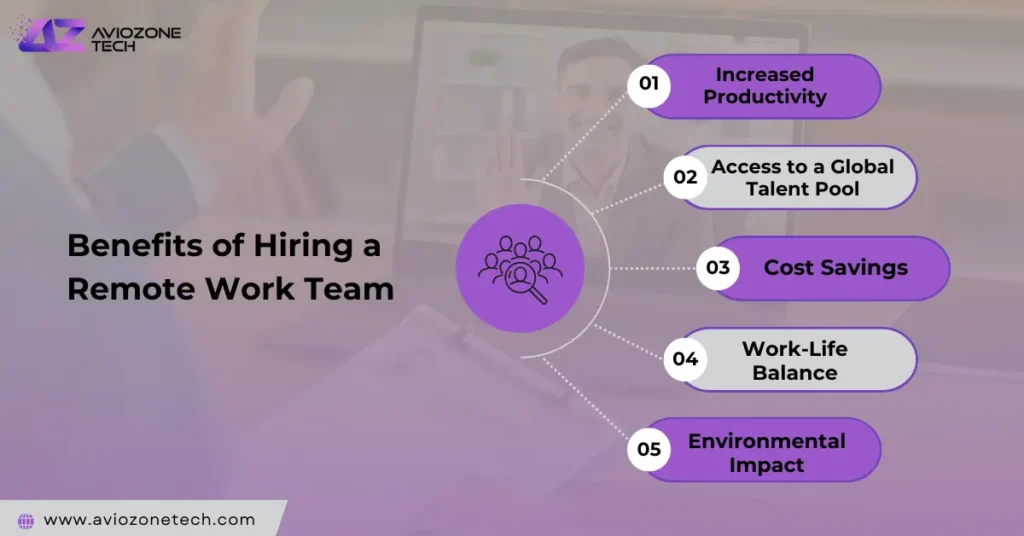The Benefits and Challenges of Hiring a Remote Work Team
The rise of remote work has revolutionized the traditional office environment. With technological advancements and changing work preferences, businesses are increasingly adopting remote work models. Exploring the Benefits and Challenges of Hiring a Remote Work Team reveals how this shift offers numerous advantages and introduces several obstacles.
Understanding these aspects is crucial for businesses considering or currently managing a remote work team.
Benefits and Challenges of Hiring a Remote Work Team
Hiring a remote work team has become an increasingly popular strategy for businesses worldwide, offering a range of compelling benefits alongside distinct challenges.
However, this approach also demands robust strategies to overcome obstacles such as communication barriers, time zone differences, and maintaining team cohesion.
Understanding the advantages and hurdles of remote work is crucial for organizations aiming to utilize its potential while ensuring effective team dynamics and performance.
Benefits of Hiring a Remote Work Team

1. Increased Productivity
One of the most significant benefits of hiring a remote work team is the potential for increased productivity. Remote workers often enjoy fewer distractions compared to a traditional office setting.
The absence of lengthy commutes and office interruptions allows employees to focus more on their tasks, leading to enhanced efficiency.
2. Access to a Global Talent Pool
Hiring remotely opens the door to a global talent pool. Businesses are no longer confined to hiring individuals within a specific geographic location. This access to diverse talent can lead to innovative ideas and solutions, enriching the company capabilities.
It also allows companies to fill niche roles with specialized skills that might be scarce in their local market.
3. Cost Savings
Remote work can lead to significant cost savings for businesses. Without the need for physical office space, companies can reduce or eliminate rent and utility expenses.
Additionally, remote work can lower costs related to office supplies, equipment, and maintenance. These savings can be redirected into other areas of the business, such as research and development or employee benefits.
4. Flexibility and Work-Life Balance
Remote work offers employees greater flexibility, which can enhance work-life balance. This flexibility can lead to higher job satisfaction and lower turnover rates.
Employees can tailor their work schedules to fit their personal lives, resulting in a happier and more dedicated workforce. This balance is particularly appealing to millennials and Gen Z workers, who prioritize work-life harmony.
5. Environmental Impact
The environmental benefits of remote work are substantial. Reduced commuting results in lower carbon emissions, contributing to a greener planet.
Additionally, remote work can decrease the demand for office space, which can reduce the environmental impact associated with construction and office maintenance. Companies adopting remote work models can thus play a part in promoting sustainability.
Challenges of Hiring a Remote Work Team

1. Communication Issues
Effective communication is often one of the biggest challenges in remote work. The lack of face-to-face interaction can lead to misunderstandings and a lack of clarity.
Relying on emails, chats, and video calls requires clear and concise communication skills. Miscommunication can affect project timelines and team cohesion.
2. Time Zone Differences
Managing a remote team across different time zones can be challenging. Scheduling meetings that accommodate everyones time zone can be difficult, and asynchronous communication can lead to delays. Time zone differences can also affect team collaboration and the speed at which decisions are made.
3. Management and Oversight
Remote work requires a different approach to management and oversight. Managers must trust their employees to complete tasks without constant supervision. This shift can be difficult for managers accustomed to traditional oversight methods.
Additionally, tracking productivity and ensuring accountability can be more challenging in a remote environment.
4. Technology and Cybersecurity Concerns
Remote work relies heavily on technology, which can present its own set of challenges. Ensuring that all team members have access to reliable internet and necessary tools is essential.
Cybersecurity is another major concern, as remote work increases the risk of data breaches. Companies must invest in robust cybersecurity measures to protect sensitive information.
5. Building Company Culture
Maintaining a strong company culture can be difficult with a remote team. The lack of physical interaction can lead to feelings of isolation and disconnection among employees.
Building a cohesive and inclusive company culture requires intentional effort and creative solutions to foster a sense of community.
Strategies to Overcome Remote Work Challenges
Effective Communication Tools
Utilizing effective communication tools is crucial for overcoming the communication barriers of remote work. Platforms like Slack, Microsoft Teams, and Zoom can facilitate real-time communication and collaboration. Encouraging regular check-ins and virtual meetings can also help maintain clear communication.
Flexible Scheduling
Implementing flexible scheduling can help address time zone challenges. Allowing employees to work during their most productive hours, regardless of traditional office hours, can enhance efficiency and job satisfaction. Flexibility can also facilitate better work-life balance.
Robust Management Practices
Adopting robust management practices is essential for overseeing remote teams. Setting clear expectations, providing regular feedback, and using project management tools can help maintain productivity and accountability. Managers should focus on outcomes rather than micromanaging processes.
Strong Cybersecurity Measures
Investing in strong cybersecurity measures is vital for protecting remote work environments. Companies should implement secure networks, use encryption, and provide training on cybersecurity best practices. Regular audits and updates can help mitigate risks and ensure data security.
Fostering a Virtual Culture
Fostering a virtual culture requires intentional efforts to build connections among remote team members. Regular virtual social events, team-building activities, and recognition programs can help create a sense of community. Encouraging open communication and inclusivity can also strengthen company culture.
Tools and Technologies for Remote Teams
I. Collaboration Software
Collaboration software is essential for remote teams. Tools like Google Workspace, Asana, and Trello enable teams to work together seamlessly, regardless of location. These platforms facilitate real-time collaboration, task management, and document sharing.
II. Project Management Tools
Project management tools help remote teams stay organized and on track. Software like Monday.com, ClickUp, and Basecamp provide features for tracking progress, assigning tasks, and setting deadlines. These tools ensure that projects are completed efficiently and on time.
III. Cybersecurity Solutions
Implementing robust cybersecurity solutions is crucial for remote work. VPNs, antivirus software, and secure file-sharing platforms protect sensitive information and ensure data security. Regular training and updates can help remote teams stay vigilant against cyber threats.
Best Practices for Remote Work
Onboarding and Training
Effective onboarding and training are critical for remote teams. Providing comprehensive training on tools, processes, and company culture can help new employees integrate smoothly. Regular training sessions can also keep team members updated on best practices and new developments.
Performance Tracking
Tracking performance is essential for managing remote teams. Using key performance indicators (KPIs) and regular performance reviews can help ensure that employees are meeting their goals. Performance tracking tools can provide insights into productivity and areas for improvement.
Regular Feedback and Reviews
Providing regular feedback and conducting performance reviews are important for remote teams. Constructive feedback helps employees improve and stay motivated. Regular reviews can also identify any issues early on and provide opportunities for growth and development.
Conclusion
Hiring a remote work team offers numerous benefits, including increased productivity, access to global talent, cost savings, and improved work-life balance. However, it also presents challenges such as communication issues, time zone differences, and cybersecurity concerns.
By implementing effective strategies and leveraging the right tools, businesses can overcome these challenges and reap the benefits of remote work. As the workplace continues to evolve, remote work will likely become an integral part of the business landscape.
FAQs
The main benefits include increased productivity, access to a global talent pool, cost savings, enhanced flexibility and work-life balance, and positive environmental impact.
Businesses can use effective communication tools like Slack and Zoom, encourage regular check-ins and virtual meetings, and promote clear and concise communication practices.
Cybersecurity concerns include the risk of data breaches, secure access to company systems, and ensuring all remote workers follow best practices for data security. Investing in strong cybersecurity measures is essential.
The future of remote work looks promising, with trends indicating an increase in hybrid work models and continued advancements in technology facilitating remote work. The workplace will evolve to meet the growing demand for flexibility and work-life balance.




